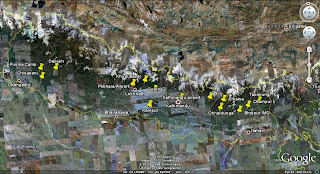The following statement appears on page 20 of the Climate Commission's report "
The Critical Decade".
"The IPCC AR4 has been intensively and exhaustively scrutinised, including formal reviews such as that by the InterAcademy Council (2010), and only two peripheral errors, both of them in the WG 2 report on impacts and adaptation, have yet been found (in a publication containing approximately 2.5 million words!)."
on page 19:––The IPCC’s Fourth Assessment Report has been intensively and exhaustively scrutinised and is virtually error-free.
Here are links (below) to the IPCC's own list of errors in the
AR4 report. Combined it runs to about 3200 words. When we cut and pasted them all into MSword we ended up with 31 pages. These errors were noted
after the report was published which doesn't say much for the "exhaustive, thorough process" of review described by the climate commissioners.
"The Fourth Assessment Report (AR4), published in 2007, involved about 1,250 expert authors and 2,500 reviewers, who produced about 90,000 comments on drafts, each one of which was addressed explicitly by the authors (ed. many of these were totally ignored)". Here's how some IPCC authors dealt with peer reviewed papers critical of the IPCC consensus:
"I can't see either of these papers being in the next IPCC report. Kevin and I will keep
them out somehow - even if we have to redefine what the peer-review literature is !
New errors have been noted in AR4 as recently as last month.
(Note our own small contribution to the list of errors in WG2 brought about thanks to the ABC's reliance on the IPCC as a "reliable" source of climate information-seems parts of Sri Lanka were not warming at a rate of 2 degrees per year).
Errors in WORKING GROUP I
Note. The following is a list of errata and corrections to the Working Group I contribution to the IPCC Fourth Assessment Report.
Last updated: 4 April 2011
Note. The following is a list of errata and corrections to the Working Group II contribution to the IPCC Fourth Assessment Report.
Last updated 24 February 2011
Errors in Working GROUP III
Errata for the Working Group III contribution to the Fourth Assessment Report. (
Last updated 28 July 2010)
Will the ABC report on this misleading statement, or will it continue to leave its audience in the dark?






